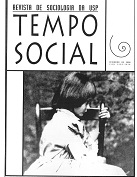O Brasil sob Cardoso: neoliberalismo e desenvolvimentismo
DOI:
https://doi.org/10.1590/S0103-20701999000200003Palabras clave:
Estado, governo, crise política, transição política, hegemonia, política econômica, desenvolvimento, neoliberalismo, Fernando Henrique CardosoResumen
Este artigo tem três partes. Na primeira, faz-se o exame dos processos de conquista do poder de Estado que culminaram na eleição de FHC usando o conceito de hegemonia e a idéia de momento maquiaveliano, derivada de Pocock. Na segunda parte, mostra-se que o novo bloco político no poder, para além de sua orientação liberal e internacionalizante, polariza-se entre duas versões contrapostas de liberalismo, o fundamentalismo neoliberal e o liberal-desenvolvimentismo. Discute-se os efeitos socioeconômicos da adoção pelo governo do neoliberalismo como eixo de sua política macroeconômica. Na terceira parte, analisam-se as razões políticas que levaram a Presidência reiteradamente a essa escolha. A hipótese explicativa sugerida é de que a Presidência da República interpretou a manutenção do fundamentalismo neoliberal como um meio decisivo para assegurar o necessário controle sobre o sistema político. Sugere-se, ao final, que as mudanças macroeconômicas iniciadas em janeiro de 1999 dão as bases para uma reorientação liberal-desenvolvimentista do governo.
Descargas
Referencias
BARBOZA FILHO, Rubens. (1995) FHC: Os paulistas no poder. In: AMARAL, Roberto (org.). FHC: Os paulistas no Poder. Niterói, Casa Jorge Editorial, p. 93-155.
BOBBIO, Norberto et alli.(1994) Dicionário de Política. 6a edição, Vol. 1. Brasília, Editora UnB.
BIERSTEKER, Thomas J. (1995) The “triumph”of liberal economic ideias. In: STALLINGS, Barbara (org.). Global change, regional response. Cambridge, Cambridge University Press, p. 174-196.
CHESNAIS, François. (1998a) A fisionomia das crises no capitalismo mundializado. Novos Estudos, 52: 21-54, novembro.
CHESNAIS, François. (org.). (1998b) A mundialização financeira – gênese, custos e riscos. São Paulo, Xamã.
DINIZ, Eli (org.). (1993) Empresários e Modernização Econômica: Brasil anos 90. Florianópolis, Ed. UFSC/IDACON.
FIGUEIREDO, Argelina C. & LIMONGI, Fernando. (1998) Reforma da Previdência e Instituições Políticas. Novos Estudos, 51: 63-90, julho.
FIORI, José Luiz. (1995) Em Busca do Dissenso Perdido. Rio de Janeiro, Insight.
FLANAGAN, Scott. (1973) Models and methods of analysis. In: ALMOND, G. et alli (orgs.). Crisis, choice and change. Boston, Little Broen, p. 43-101.
FREIFUSS, René. (1989) O Jogo da Direita – Na Nova República. Petrópolis, Vozes, p. 181-294.
GARRETÓN, Manuel. (1993) Las transiciones en su contexto. In: Cambio XXI Fundación Mexicana (org.). Las transiciones a la democracia. Mexico, D.F., Miguel Porrua Ed.
MALLOY, James & CONNAGHAN, C. (1996) Unsettling Statecraft, democracy and neo-liberalism in Central Andes. Pittsburg, Pittsburg University Press.
MENDONÇA DE BARROS, José Roberto (org.). (1998) Agricultura e Estabilização no Brasil (1995-1998). Brasília-DF, Embrapa-SPI/Ministério da Fazenda.
NOBRE, Marcos & FREIRE, Vinícius Torres. (1998) Política difícil, estabilização imperfeita: os anos FHC. Novos Estudos, 51: 123-147.
OLIVEIRA, Francisco de. (1996) O primeiro ano do governo Fernando Henrique Cardoso (Debate). Novos Estudos, 44: 47-72, março.
PAULA, Luiz Fernando Rodrigues de & ALVES JR., Antônio José. (1999) Fragilidade financeira externa e os limites da política cambial no Real. Revista de Economia Política, 19(1): 72-93, janeiro-março.
POCOCK, J.G.A. (1975) The Machiavellian Moment. Princeton, Princeton Univerty Press.
SALLUM JR., Brasilio. (1996) Labirintos – Dos generais à Nova República. São Paulo, Hucitec/Sociologia-USP.
SALLUM JR., Brasilio. (1997) Estamos reorganizando o capitalismo brasileiro (entrevista de Fernando Henrique Cardoso). Lua Nova, São Paulo, 39: 11-31.
SALLUM JR., Brasilio. (1998) Globalização e Estratégia para o Desenvolvimento: o Brasil nos anos 90. In: DINES, Alberto et alii. Sociedade e Estado: Superando Fronteiras. São Paulo, Edições Fundap, p. 243-280.
SCHWARTSMAN, Alexandre. (1999) A crise cambial e o ajuste fiscal. Revista de Economia Política, 19(1): 5-29, janeiro-março.
SOLA, Lourdes & KUGELMAS, Eduardo. (1996) Statecraft, instabilidade econômica e incerteza política: o Brasil em perspectiva comparada. In: DINIZ, Eli (org.). Anais do Seminário Internacional: O desafio da democracia na América Latina.Rio de Janeiro, Iuperj, p. 398-414.
TAVARES DOS SANTOS, José Vicente. (1998) Relatório Final do Projeto “Conflitos Sociais Agrários”. Convênio FAO-INCRA/IFLCHUFURGS, dezembro.
UNGER, Roberto Mangabeira. (1998) Democracy Realized – The progressive alternative. London/NewYork, Verso.
VIANA, Luiz Werneck. (1995) O Coroamento da Era Vargas e o Fim da História do Brasil. Dados, Rio de Janeiro, 38(1): 163-170.
Descargas
Publicado
Número
Sección
Licencia
Derechos de autor 2015 Tempo Social

Esta obra está bajo una licencia internacional Creative Commons Atribución-NoComercial 4.0.


